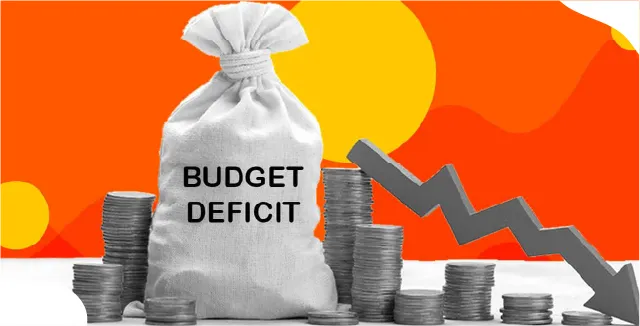What is Budget Deficit? Causes, Effects & Fiscal Impact

Check Your Loan Eligibility Now
By continuing, you agree to LoansJagat's Credit Report Terms of Use, Terms and Conditions, Privacy Policy, and authorize contact via Call, SMS, Email, or WhatsApp
A budget deficit happens when a government spends more money than it earns through taxes and other income. It is often used to assess a country’s financial health and stability.
Let’s understand this with an example.
The Indian government planned to spend ₹100 lakh crore in a financial year but earned only ₹85 lakh crore through taxes and other income.
This shortfall of ₹15 lakh crore is called a budget deficit. When this gap continues year after year, the government may need to borrow money or cut spending in certain areas.
Government Budget Overview
Governments often use budget deficits to support the economy during difficult times, like recessions, by increasing spending on jobs, welfare, or development projects. However, long-term deficits can lead to rising debt and interest payments.
Key Components of a Budget Deficit
A budget deficit arises when total expenses exceed total revenue. To understand it clearly, let’s break down the two main components:
1. Revenue
Governments mainly earn revenue through:
- Income tax
- Corporate tax
- Consumption tax (e.g., VAT)
- Social insurance contributions
Companies earn revenue by selling goods or services to customers.
2. Expenses
Government spending includes:
- Healthcare
- Defence
- Infrastructure projects
- Pensions and subsidies
For companies and other organisations, expenses cover:
- Daily operations
- Salaries and wages
- Rent and utilities
- Raw materials or production costs
By comparing these two, we can see when spending exceeds earnings, leading to a budget deficit.
Understanding Budget Deficits: Meaning, Impact, and Example
A budget deficit occurs when a government's spending is greater than its revenue from taxes, fees, and other sources.
To fix a deficit, the government may cut non-essential spending or raise income by increasing taxes or improving collections. However, if the deficit continues, the country may borrow more, which increases its debt and interest burden and leaves less money for future development.
Key Points to Understand:
- A budget deficit = Expenses > Revenue
- A budget surplus = Revenue > Expenses
- A balanced budget = Revenue = Expenses
- Continuous deficits lead to more borrowing and less reinvestment
Historical Insight
During World War I, many industrial countries borrowed heavily. For example:
- UK deficit in 1918: ₹2,000 crore (approximate modern equivalent)
- By 1970, slow economic growth made it hard to recover
- From 1914 to 1970, some nations ran deficits in 40 out of 56 years
India's Budget Snapshot(This is not real data, just for example)
In this example, India faces a ₹18 lakh crore deficit, and nearly ₹10 lakh crore goes into interest payments alone. This limits funds for development, forcing the government to prioritise or cut back.
Causes of a Budget Deficit: Why Governments Spend More Than They Earn?
A budget deficit happens when a government’s spending becomes higher than its income from taxes and other sources. Several economic, social, and political factors can cause this gap. Both low revenue and high expenses contribute to the problem.
Here is a clear breakdown using examples and figures:
Major Causes of Budget Deficit
Effects of a Budget Deficit
A budget deficit affects individuals, businesses, and the economy. To reduce it, the government often adjusts its spending and tax policies.
Main Effects:
- Reduced Public Spending: Less funding for healthcare, pensions, or infrastructure projects.
- Higher Taxes: Increased taxes on high earners or big businesses may limit hiring and investment.
- Slower Growth: Cuts and tax hikes can reduce demand and slow the economy.
- More Borrowing: Higher debt leads to increased interest payments and fewer funds for development.
Strategies to Reduce Budget Deficits
Governments reduce budget deficits by cutting spending, raising taxes, and borrowing wisely.
Example: Mr Sharma, an advisor to the Indian government, tackled a ₹12 lakh crore deficit by:
- Cutting non-essential spending (saved ₹2 lakh crore)
- Increasing taxes on high earners (raised ₹1.5 lakh crore)
- Issuing bonds to borrow ₹3 lakh crore
- Boosting growth through infrastructure investment
This balanced approach helped control the deficit without harming the economy.
Difference Between Federal Budget Deficit and Federal Government Debt
Many people confuse the federal budget deficit with the federal government debt, but they are not the same. A budget deficit happens when the government spends more than it earns in a single year. In contrast, the government debt is the total amount the country owes from all past deficits combined.
Here’s a clear comparison:
Budget Deficit vs Government Debt
Budget deficits are yearly shortfalls, while government debt is the long-term result of those shortfalls over time. If debt rises faster than GDP, it may put pressure on the economy.
What Can the Government Do About a Budget Deficit?
To reduce a budget deficit, the government uses fiscal policies that focus on increasing income or reducing spending. These actions aim to improve the country’s financial position and support long-term growth.
Common Steps the Government Can Take:
- Reduce Government Spending
The government can cut down on non-essential programmes or delay large infrastructure projects to save money.
- Increase Taxes
It may raise income or corporate taxes, especially for high earners, to bring in more revenue.
- Encourage Economic Growth
By supporting small businesses and creating jobs, the government can increase tax collections through higher earnings and spending.
These strategies help the government manage the deficit while keeping the economy stable.
What Causes a Budget Deficit to Improve?
A budget deficit improves when the government earns more or spends less. This often happens during strong economic periods. Here's a simple table that explains the main reasons:
Conclusion
A budget deficit happens when a government's spending is more than its income. It shows that the country is borrowing to meet its needs. When managed carefully, a deficit can support growth. But if it grows too large, it may harm the economy and increase debt.
FAQ’s
1. What is a budget deficit?
A budget deficit happens when a government's spending is more than the income it receives from taxes or other sources.
2. What causes a budget deficit?
It usually happens due to high public spending, tax cuts, or low economic growth that reduces revenue.
3. Is a budget deficit always bad?
Not always. A small deficit can support growth, but a large or long-term deficit may increase debt and hurt the economy.
4. How can a government reduce a deficit?
The government can reduce a deficit by cutting spending, raising taxes, or boosting economic growth to increase revenue.
5. What is the difference between deficit and debt?
A deficit is a gap in a single year’s budget. Debt is the total amount the government owes over time.
Other Informative Pages | ||
About the author

LoansJagat Team
Contributor‘Simplify Finance for Everyone.’ This is the common goal of our team, as we try to explain any topic with relatable examples. From personal to business finance, managing EMIs to becoming debt-free, we do extensive research on each and every parameter, so you don’t have to. Scroll up and have a look at what 15+ years of experience in the BFSI sector looks like.
Subscribe Now
Related Blog Post
Recent Blogs
Contents
Quick Apply Loan
Consolidate your debts into one easy EMI.
Takes less than 2 minutes. No paperwork.
10 Lakhs+
Trusted Customers
2000 Cr+
Loans Disbursed
4.7/5
Google Reviews
20+
Banks & NBFCs Offers
Other services mentioned in this article








